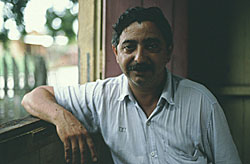
The world knows him as a martyr, who died while preventing the destruction of the Amazon forests. Born in 1944 in the Brazilian Amazon, Chico Mendes earned his living as a rubber tapper. Besides extracting latex from rubber trees, the tappers also collected and sold minor forest produce like nuts, fruits and native medicines.
As a leader of the tappers union, Chico campaigned for “extractive forest reserves” for tappers, who would use and maintain the rainforest in its natural state for generations. He ran into a conflict with powerful groups interested in clearing the forests for raising cattle. Chico argued that clearing would remove valuable forests and overgrazing would reduce soil fertility. Ranching would only bring short-term gains.
In 1988, the Xapuri Rural Workers’ Union led by Chico successfully prevented the powerful cattle rancher, Darli Alves, from deforesting an area that the tappers wanted as a reserve. On December 22, 1988, Chico was shot dead. Darli was later convicted for Chico’s murder.
The death of Chico brought international attention to the question of saving the Amazon forests. His name has become synonymous with the worldwide fight to save forests. In 1990, the Chico Mendes Extractive Reserve was established and so also the Chico Mendes Foundation.
Chico Mendes had this to say about his work: “First I thought that I was fighting for the rubber tappers, then I thought I was fighting for the Amazon, then I realized I was fighting for humanity.”

I had the opportunity of visiting a tribal village in the course of one of my assignments. The State Act provides that the forest produce is to be harvested through a tender process with a tilt towards tribal participation. When I participated in some of their discussions, it was revealed that they harvest only 75 to 80% of the yield. I was a bit surprised and requested them to explain the practice. To which, one of the more articulate among them said that it was both a norm and custom of the place. The balance 20 to 25% of the yield was meant for other animals and birds and also that it would aid in better harvests for the next year. How scientifically it is correct I know not, but concern for the forest and other living creatures in the forest is what we have to note. They also reported that by any chance the tender went in favor of outsiders (meaning, urban exploiters), they would harvest 100% without any concerns. They actually had no stake in the wellness of the forest and they were into the venture only for commercial gains. This was often a struggle between forest officials and forest dwellers.
They were also concerned that their children getting educated would never come back and the future looked bleak for the forests to survive. They also expressed that even if they do come back, they will return with commercial attitudes and will be no different from the exploiters. Is there an end to human greed? Some of these stories should sensitize us towards simply living so that we can stop exploiting the nature resulting in conservation through conscious efforts.
K.S Ravi’s reply is insightful in addition to the Story of Chico Mendes.. I want to echo…” sensitize us towards simply living …to stop exploiting nature” for greed. Is there that this Pandemia has taught us is living simpler is good for the health (Humans and our Planet given the rise in nature’s clean air, waters, and happy flora/fauna)
Loved this statement by Chico Mendes “First I thought that I was fighting for the rubber tappers, then I thought I was fighting for the Amazon, then I realized I was fighting for humanity.”
Its’ a good example that we shouldn’t think too much before doing things we believe in. That way we may never start.. It may not make much sense in the beginning but it could be the conduit towards something that might make a big difference later on..